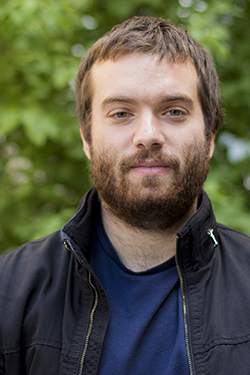Ioannis stayed in Sweden and now works for a municipality
Ioannis Ntriankos graduated from the master’s programme in Transport and Geoinformation Technology in 2018. He now works for Gävle municipality as a Traffic Planner.

Hi Ioannis, what does a regular day look like at your job?
It varies quite a lot so it’s difficult to say what constitutes a regular day. I could be mostly in the office working on a traffic analysis for a new housing or business area in the city. But there is quite a variety of work even during one day - which could include meetings for a specific project, performing analyses, contacting citizens for a traffic-related issue and/or for a city council committee. One thing that is constant though is that the municipality has a one-hour lunch break at noon and two coffee breaks; one in the morning and one in the afternoon.
Why did you choose this programme at KTH?
My previous education focused on spatial planning and development. Since I wanted to move towards a more analytical area, I searched for master programmes offered in English and which combined geoinformatics with a specific type of planning. The Master’s programme in Transport and Geoinformation Technology was the best programme I found that matched my previous studies and that was offered by a university with good connections to the industry and of a high academic quality.
Are there any insights you acquired during your studies that have been particularly useful for you in your career?
It is more the process of learning and the theoretical knowledge than the learning itself; I would also say the analytical thinking that continues after you graduate. A more concrete example is that my knowledge of statistics, modelling and simulation was enhanced during my studies in KTH, and has proven to be quite useful in my work.
What were the best aspects of your studies at KTH?
The programme combines geoinformatics and transport engineering and planning and offers a good combination of theory and practice. Throughout the two years each student is involved in (simplified) real case scenarios, while there are opportunities for connections with the industry.
What would you say to a student thinking of applying for this programme?
The programme offers a good knowledge in two growing fields: geoinformatics and transport science. It is also developed in an international environment. Plan in advance and be consistent when it comes to the degree and you will both gain a lot of knowledge and have a balanced life. Consider also the cost as Stockholm is quite expensive, but there are many sites with information so you should be able to get a good idea of what it will cost. For international students who want to work in Sweden afterwards, I would advise them to plan with that in mind; make contacts and learn a bit of Swedish. And, at the current time there is a great demand for personnel specialized in both geoinformatics and transport science.
